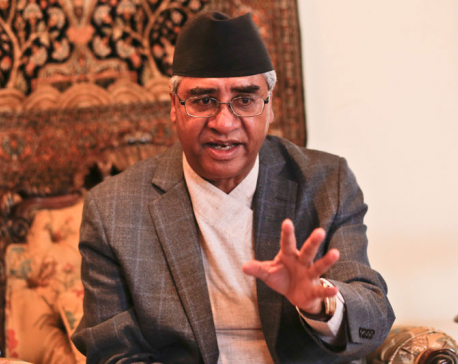
OR
Government of national unity
Having gone back on his now two-month-old decision to withdraw support from Oli government, CPN (Maoist Center) chairman Pushpa Kamal Dahal is struggling to reestablish his credibility with Nepali Congress leadership. Congress had supported his prime ministerial bid as the biggest party in parliament believed that the government of KP Sharma Oli had been a dismal failure. Corruption and misrule characterized his governance, Congress alleged, and Oli had also failed to resolve outstanding constitutional issues. Madheshi parties also tacitly supported the initiative to bring down Oli government, as did India. But Dahal made a U-turn overnight. He said he would continue to support Oli as prime minister and allow the government to bring the annual budget. It is hard to pin-point what made him change his mind. But it was widely reported that there had been a ‘gentleman’s agreement’ between Messrs Oli and Dahal to hand over government leadership to the Maoist chairman after the budget presentation.
But even after the unveiling of the budget, Oli refused to step down. This is why Dahal has of late once again tried to woo Congress leadership.
Congress is having none of it. Senior Congress leaders like Sher Bahadur Deuba and Ram Chandra Poudel have ruled out any possibility of the kind of ‘national unity government’ the Maoists have been pitching for of late. They have categorically told Dahal that the only way they will support him again is if the Maoists leave the Oli government first. Congress leadership is also not keen on a national unity government with a broad political base, possibly because they fear that unless Oli is first removed, Oli and his UML party will seek to convert the current majority government into a government of national unity. To go into the three elections—local, provincial and federal—slated for next 20 months under UML leadership, in their reckoning, would be to commit an electoral hara-kiri. This is why Congress leaders are more inclined towards another majority government, preferably with the support of the Maoists and other small Madheshi parties. That apparently is the only way to stop the UML organizational juggernaut from sweeping the polls.
In our view, there is no point in replacing one majority government with another majority government, as Congress apparently wants. Such attempts to corner UML will backfire since it will not be possible to amend the constitution to the liking of Madheshi and Janajati forces without UML’s support. We also think that the fear among Congressis that the UML will ‘hijack’ elections if the reins of power are not wrested away from them is exaggerated. Nepal is no Bangladesh. The instruments available to Nepali rulers to influence elections are limited. The vibrant media landscape means that any electoral hanky-panky quickly comes to light. Ubiquitous security cameras, close monitoring of international observers, adequately backed by many more Nepali observers, makes it extremely hard to pull off the kind of ‘ballot-stuffing’ the country became notorious for during the 1990s. Which is why it is important for at least the four major political forces—Congress, UML, Maoists and Madheshi parties—to together work to create a conducive environment for implementation of the new constitution and holding of the three sets of elections. Isn’t that how the two CA elections became possible? Only a government of national unity will have both the legitimacy as well as the authority to undertake such a mammoth task.
You May Like This

Time has come for full implementation of constitution: PM Deuba
BHAKTAPUR, Oct 20: Prime Minister Sher Bahadur Deuba has said time has come to fully implement the constitution by ending... Read More...

Time has come
Addressing a seminar in Kathmandu on Chinese President Xi Jinping’s signature One-Belt-One-Road (OBOR) initiative, Deputy Prime Minister Krishna Bahadur Mahara... Read More...

Prime minister has no time for IBN meetings
KATHMANDU, Dec 1: Investment Board Nepal (IBN) has not been able to hold even a single board meeting in the past... Read More...





Just In
- MoHP cautions docs working in govt hospitals not to work in private ones
- Over 400,000 tourists visited Mustang by road last year
- 19 hydropower projects to be showcased at investment summit
- Global oil and gold prices surge as Israel retaliates against Iran
- Sajha Yatayat cancels CEO appointment process for lack of candidates
- Govt padlocks Nepal Scouts’ property illegally occupied by NC lawmaker Deepak Khadka
- FWEAN meets with President Paudel to solicit support for women entrepreneurship
- Koshi provincial assembly passes resolution motion calling for special session by majority votes






_20220508065243.jpg)






Leave A Comment